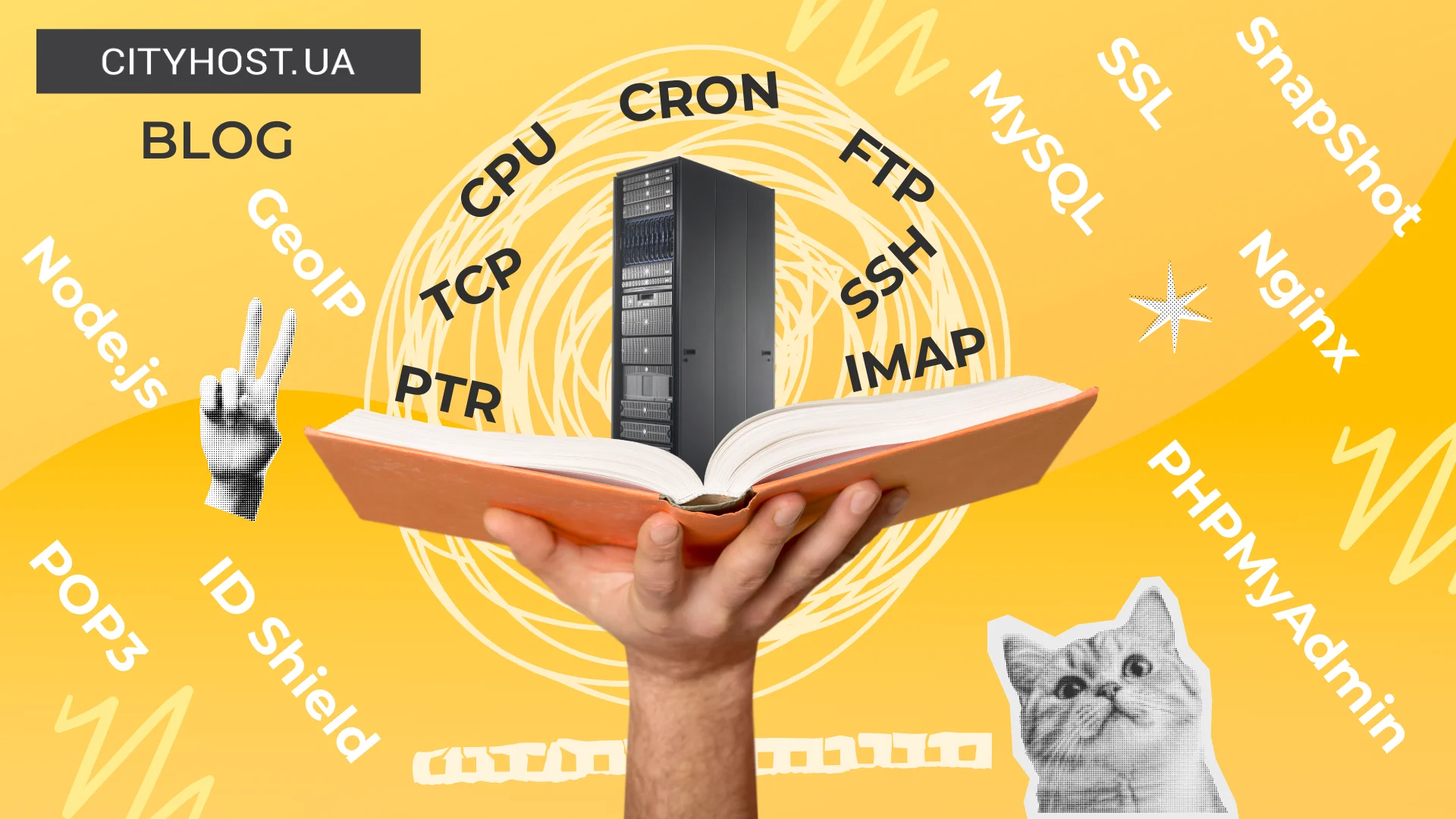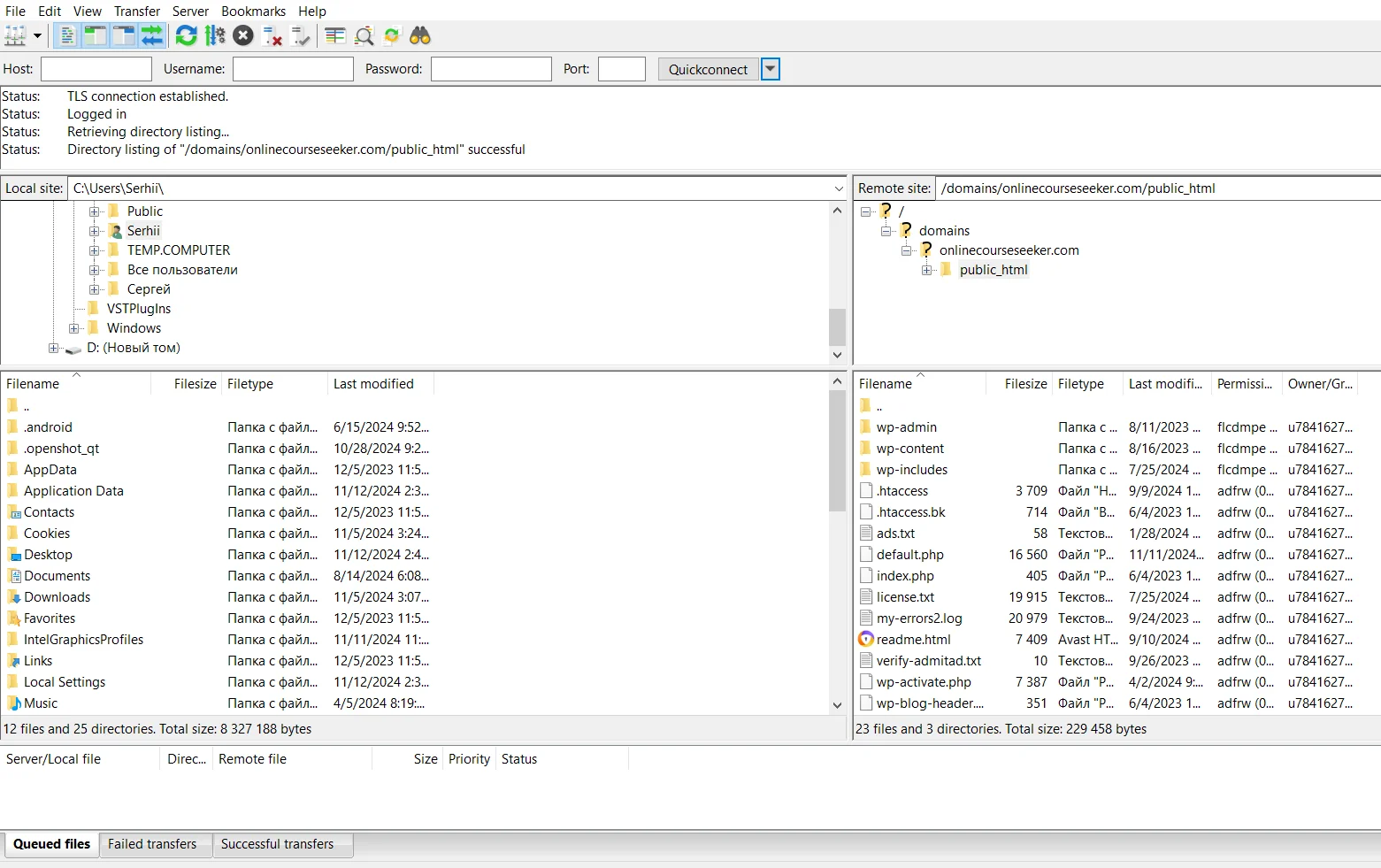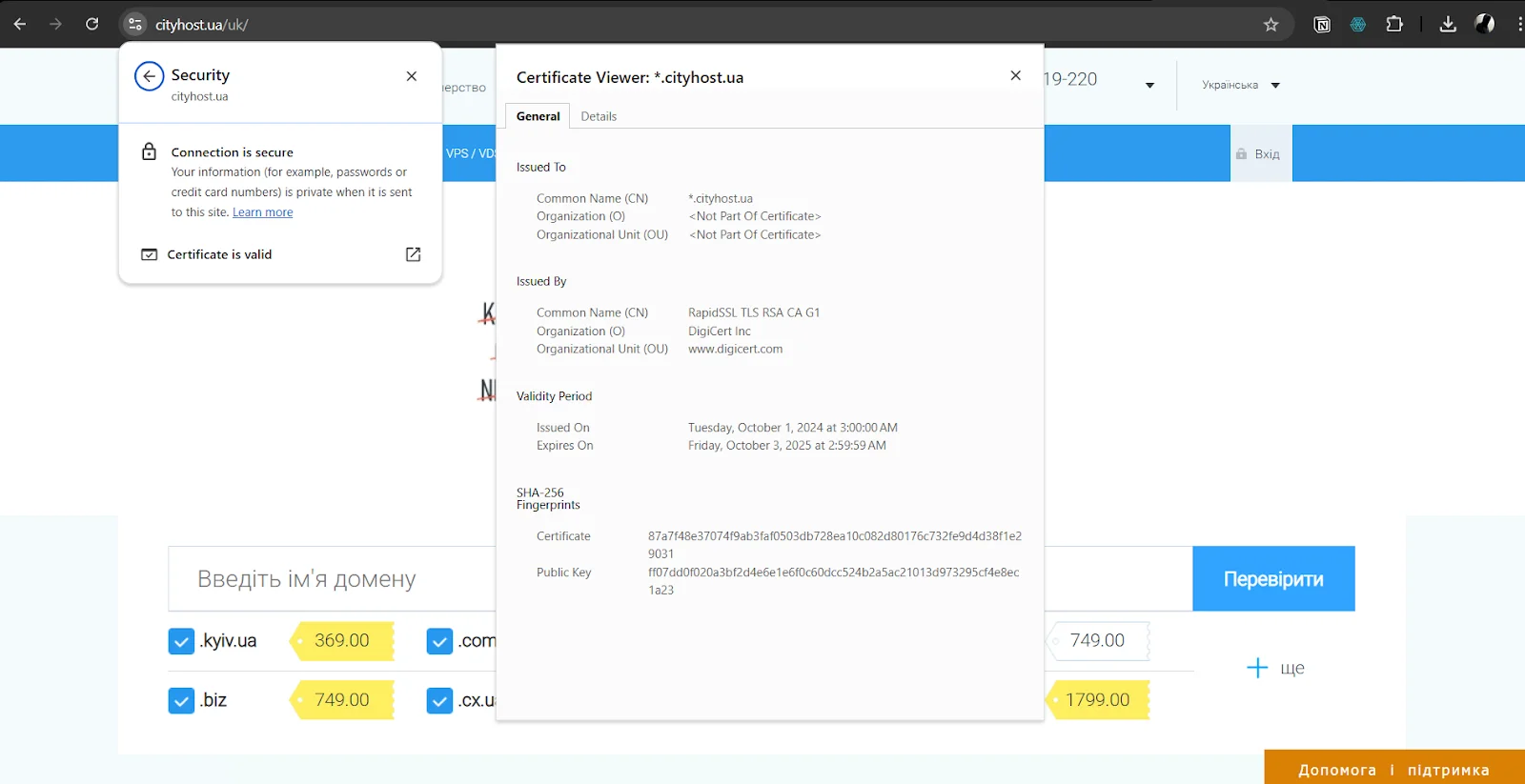
We offer an intuitive control panel with tips and step-by-step instructions for those looking to create their own website. However, beginners may still encounter unfamiliar terminology, so we decided to create the glossary for users. It contains brief, clear definitions of key terms — from basic ones like domain, hosting, and website to more advanced concepts like SMTP, GeoIP, SSH, and others. With our glossary, you can familiarize yourself with the terminology and fully utilize all the tools available for creating, configuring, and enhancing any type of web resource or web application.
CGI
Common Gateway Interface — a technology that establishes a connection between an external program and a web server. It extends the functionality of an online project, turning static pages into dynamic ones. For example, CGI can be used to create forms and counters on a website, allow users to leave comments, messages (forums), or suggestions (classified boards).
CPU
Central Processing Unit — the central processor responsible for processing commands on a server. It handles the load generated by each script execution or database query. The more powerful the CPU, the faster the website operates under high loads. At Cityhost, you can rent virtual servers with varying numbers of CPUs, such as two for medium-sized websites or six for large-scale, high-traffic projects.
CRON
CRON — software for executing one or more tasks at a specified time automatically. This tool can be used to regularly back up websites and databases, clean temporary files, update data, send messages, and more.
Website
A website is one or more web pages united by a domain name and a common concept. There are various types of web resources, including landing pages, blogs, aggregators, and online stores. Thanks to modern technologies and Cityhost's capabilities, anyone can create a website in just a few clicks: register hosting and a domain, install a CMS using the auto-installer, customize the template, and add content (articles, products, etc.).
Read also: How to create your website for business: independently, easily and relatively cheaply
DNS
Domain Name System — a system that converts familiar domain names into computer-readable IP addresses. This significantly simplifies the search for information, as we don’t need to input lengthy IP addresses.
Read also: What is DNS and How the Domain Name System Works
DNS Record
A DNS record is an individual element in the Domain Name System that specifies how a domain connects to specific resources or server settings. For example, CNAME defines a domain alias, while MX directs emails to mail servers associated with the domain.
Learn more about the various types of records in the article: Domain DNS record types: NS, A, AAAA, CNAME, TXT, ALIAS, SRV
Firewall
A firewall (also known as a network firewall) is a hardware (physical device) or software (applications or operating system components) tool that analyzes traffic and blocks unwanted network packets. It acts as a filter for a network or computer, controlling which data can enter or exit the network and blocking suspicious or dangerous connections.
A firewall is like a security guard at the entrance, checking who has the right to enter or leave and protecting your computer from unwanted visitors or attacks.
FTP

Interface of free FTP client FileZilla
File Transfer Protocol — a technology that allows users to connect to a server to view, edit, delete, or add files. It works like a courier: you connect to the server, select files for transfer, and FTP delivers them to the desired location.
Website owners use FTP clients (e.g., FileZilla) to remotely manage their website's files. However, we also offer a more convenient option — a file manager accessible via the control panel.
GeoIP
GeoIP is a library that allows you to obtain a visitor's location data based on their IP address, enabling personalized content delivery on the website. Information such as country, city, internet provider, and connection type is retrieved from free GeoLite2 geolocation databases. Learn more about using the GeoIP module on this page.
HTTP/HTTPS
HTTP is a protocol for transmitting and receiving data over the Internet in plain text. HTTPS (standard HTTP + SSL security protocol) is an enhanced version that transmits data in encrypted form. This is especially important for websites where users enter contact details, login credentials, passwords, or bank card information.
ID Shield
ID Shield is a domain registrar service that allows the domain name owner to hide personal information in the WHOIS database. When this feature is activated, the registrar's proxy server data is displayed in the registry, protecting you from spam and fraud. Cityhost enables domain owners to conceal their data in international domain zones through the control panel.
IMAP
Internet Message Access Protocol is a bidirectional email access protocol that copies messages to the email client while keeping the originals on a remote server. IMAP is a more modern alternative to POP3, allowing information to be accessed from any device, enabling multiple users to work with emails simultaneously, and providing a high level of security.
ionCube Loader
ionCube Loader is a tool for decoding and executing PHP files encrypted using the ionCube method. It allows working with these files while keeping the program code secure.
The tool is akin to a key for a safe: the key opens the safe to access its contents, and ionCube Loader decrypts protected code, enabling its use without exposing the internal logic.
IP Address
An IP address is a unique identifier of a device, containing information about its location. It consists of a specific number of digits: the classic IPv4 format uses four decimal numbers, while the modern IPv6 format uses eight groups of hexadecimal numbers. You can find your IP address through the properties of your current connection, the command line, or specialized websites such as ip.cx.ua or 2ip.ua.
Memcache/OPcache/Redis
Caching is the temporary storage of data in a special area to ensure quick access to it in the future. For websites, several services help speed up server performance by reducing computational load:
- OPCache stores precompiled PHP script code in memory during client requests;
- Memcached uses hash tables and operates on a "key-value" principle;
- Redis is an enhanced version of Memcached with broader functionality.
Learn more about these server caching methods in the article: Caching services for sites: Memcached, OPCache, Redis
MySQL
MySQL is a popular relational database management system where elements are interconnected using keys. It provides fast access to files, supports multi-user operations, and enables encryption, making it widely used in systems like WordPress and Joomla CMS.
Read also: What is a database and what is it used for
Next.js
Next.js is a JavaScript framework for building complex web applications or upgrading older web projects. While the React library is used for creating program interfaces, Next.js adds hybrid static and server rendering, extends functionality, and optimizes pages for faster loading.
Nginx
Nginx is one of the most popular server software programs, compatible with many Unix-like operating systems, including FreeBSD, OpenBSD, and Linux. Its flexibility, robust security, and support for distributed load with customizable control parameters make it widely used for designating dedicated ports or IP addresses, acting as a proxy (data caching), serving as a mail server (redirecting users to mail services), and accelerating request processing.
Node.js
Node.js is a runtime environment that enables JavaScript programs to run outside of a browser. This versatility allows developers to work on both the frontend and backend, simplifying the development and maintenance of projects such as web applications, scalable APIs, real-time applications (chats, multiplayer games), streaming programs (audio and video processing, real-time analytics).
PHP
PHP is a popular programming language most commonly used for building websites and web applications. It is known for its simple syntax, compatibility with various server software, ability to handle high loads, and integration into HTML documents. PHP is supported by most hosting providers, including our servers.
PHPMyAdmin
PHPMyAdmin is a web-based interface that provides access to databases directly through a browser. We also offer this management tool, allowing you to create new databases, edit existing ones (add, modify, and delete columns), execute SQL queries, import and export data, grant other users access with varying privileges.
POP3
POP3 (Post Office Protocol 3) is a reliable and convenient protocol for accessing email, particularly if you prefer working with offline mail. With POP3, messages are stored on your device, allowing you to organize and read them without an internet connection. However, if you need to access your email from multiple devices or keep folders synchronized with the latest changes, the modern IMAP protocol is a better choice, as it keeps messages on the server for easier access and synchronization.
PTR
PTR record is a type of DNS record that maps an IP address to a domain. Most mail servers perform a reverse DNS lookup for the IP address connecting to them. Without proper configuration of this record, messages may be rejected or sent to the "Spam" folder. A detailed guide on setting up a PTR record for proper mail operation can be found on our other page.
RAM (Random Access Memory)
RAM is the memory used by a server to store and quickly access temporary data. The more RAM a server has, the higher its performance, which results in faster page loading and user request processing.
SMTP
Simple Mail Transfer Protocol is the protocol used for sending email. It handles email transmission from the client program to the server, which then delivers the message to the recipient. SMTP works in conjunction with protocols for receiving messages, such as the older POP3 or the newer IMAP.
SnapShot
SnapShot is a technology for creating instant snapshots of a file system, virtual machine or server at a certain point in time. Unlike a classic backup, a snapshot is made in a couple of seconds and has a minimal impact on the system, but also records only the current state, is saved next to the original data (cannot be transferred to a third-party media), remains for a short time and is automatically deleted.
You can learn more about snapshot and backup from the article: Why it is important not to forget about backups and how to make a backup copy of your site
SSH
SSH is a network protocol for securely connecting to another computer via the Internet. Owners of Internet projects often use it to administer servers, access files and settings, and securely transfer data. Only Security Shell is not a graphical shell (a black screen where you enter text commands), so Cityhost has a control panel in the client account that makes work easier.
However, sometimes you need to work with SSH. When? You can find out about this in the article: What is SSH and the main ways to work with it.
SSL Certificate
SSL is a security protocol that protects the transmission of information, including passwords and payment data, between the user and the website. An SSL certificate is a set of files on the server that confirms a secure connection using this protocol.

At Cityhost, you can install both free and paid certificates. Read more about their differences, installation, and verification in this article, complete with detailed instructions and clear screenshots.
TCP
TCP is one of the fundamental protocols that allows devices in a network to exchange data securely. Transmission Control Protocol establishes a session between the sender and receiver, ensures information is delivered in the correct order, and verifies packet integrity.
UDP
UDP is a simple data transfer protocol that exchanges data without confirmation or delivery guarantees. It enables fast and straightforward information transmission, often used for streaming video and audio, online gaming, and DNS queries. However, some data fragments may be lost.
WEB-SSH
WEB-SSH is a tool for accessing Secure Shell through a browser. It allows users to connect to a server and execute commands directly from the control panel, saving time on installing and configuring dedicated software.
Read also: How to Connect Using WEB-SSH on Virtual Hosting
Zend Optimizer
Zend Optimizer is the only fully free software for decoding and optimizing scripts encrypted using Zend Encoder or Zend SafeGuard Suite. It works on any hosting, virtual or dedicated server with PHP installed.
Inodes
Inodes are data structures in the file system containing information about files and directories on the disk. Each time a new file is created, an inode is added, containing metadata about the object: access rights, owner, last modified time, size, and so on.
This is similar to a library card catalog: just as every file or directory has its own inode, every book has a card with its description (title, author, location on the shelf, date of last return). These cards (inodes) help to quickly find the necessary data, but they do not contain the actual data (the books).
Backup
A backup is a copy of important data from your online project that should be stored on a separate storage device. A backup helps restore data that has been damaged due to external interference (hacker attacks, virus-infected software) or internal actions (incorrect theme and plugin settings, improper changes to source code).
At Cityhost, you receive free backups, which are automatically created every day at midnight. If you decide to rent a virtual or dedicated server, you will get 50 GB of disk space to store backups on a separate, securely protected storage device.
Read also: Server health monitoring, backup and data security — what hosting customers need to know
IP Blocking
IP blocking is a security measure where the server checks the IP address before granting access to a website. If the system detects suspicious or malicious activity, it blocks the IP address, preventing spam, hacking attempts, DDoS attacks, and other harmful actions. You can manually add an IP address to the security system to restrict access from it.
Read also: Bad bots: how they harm the site and how to block them
Dedicated Server
A dedicated server is a standalone physical machine where all its resources are allocated to a single client. You choose the configuration (processor, memory, disks, etc.) and have full access to its capabilities, providing high speed and security for applications and websites. The resources and security of a dedicated server are far superior to a virtual server, which is why it is often rented for projects like news platforms, online stores, corporate websites, and web studios.
Virtual Server
A virtual server is a separate environment created on a physical server. When renting a virtual server, you get a share of the resources (processor, RAM, disk space), but don’t have access to all hardware components.
A VPS/VDS is like an apartment: it is an isolated space with its own resources, but the user does not own the entire house. A virtual server offers more freedom than a shared hosting environment but does not provide the full control you get with a dedicated server (own house).
Two-Factor Authentication
Two-factor authentication (2FA) is an extra layer of security for a user's account. 2FA involves two steps to log into the account: the first is the standard password, and the second is a code sent to the person’s phone or app, or it may include a fingerprint, voice recognition, etc.
Read also: Scammers on Facebook – How to Protect Your Business Page from Theft
Domain
A domain is a unique address for an internet project, made up of a combination of letters and numbers. A website can exist without a domain name, but it won’t be visible on the internet, and users won’t be able to find it.
Learn more about choosing a domain in this article.
CAPTCHA

CAPTCHA is a test to confirm that the user is a human, not a bot used for spamming, generating usernames and passwords. There are several types of CAPTCHA: numbers, letters, or symbols, solving simple math problems, selecting specific images, or assembling a puzzle.
Logs
Logs are separate text files containing detailed chronological information about all actions performed in a computer system. For webmasters, they help quickly identify the source of problems when errors occur with specific software, devices, or operating systems.
Control Panel
A control panel is software for managing servers and websites through an easy-to-use graphical interface. Instead of using SSH with a black screen, you get an intuitive environment where you can register domains and subdomains, configure websites, add email, manage databases, and more.
Mail Server
A mail server is a computer program that receives, processes, and delivers emails. Regular users and small businesses usually rely on third-party software, while medium and large businesses prefer to run their own mail servers.
Read also: How to Launch an Email Server on VPS to have full control over email sending and receiving processes, ensure better email security, and have your own domain.
Subdomain
A subdomain is an additional section of the main domain, often used as a way to structure the content of an internet project. It can be created for any part of the site, such as blog.website.com (blog), news.website.com (news), store.website.com (online store).
Traffic
Traffic refers to the amount of data transferred through the network over a specific period of time. When discussing website traffic, it refers to the number of visits to a web resource over a specific period (day, month, year).
Traffic can be categorized into several types:
- organic — users from search engines;
- paid — from advertising campaigns;
- social — from social networks;
- referral — links from other websites;
- direct — users who typed the URL directly or came via bookmarks.
For detailed insights, you can use the free service Google Analytics 4, which we have already covered in our guide.
File Manager
A file manager is software for adding, editing, and deleting website files.
Hosting
Hosting is the service that provides server space for hosting web resources and ensuring their availability on the internet. By renting hosting from us, you choose a server (available in Ukraine and Germany), get an easy-to-use control panel, a free domain, and an SSL certificate, the ability to create unlimited websites and mailboxes.
We've covered the essential terms to help you navigate Cityhost's website and control panel. You can save this article and return to it whenever needed. If you require professional assistance, feel free to contact our technical specialists through the phone numbers or online chat listed on our website.











